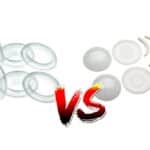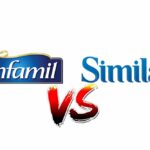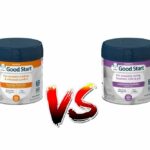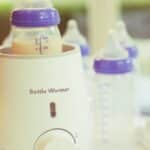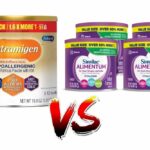Pickling is a way of preserving food by storing it in a vinegar or saltwater brine. This suppresses the microbes that cause food to rot and keeps vegetables for much longer than they would ordinarily keep.
The process can take from a few days to a week or two depending on the method you choose to use in your pickling.
The pickles we’re discussing here and pickled cucumbers, which seem like the perfect baby snack due to their malleable texture and easy to hold shape.
Should My Baby Eat Pickles?
Pickles begin their lives as cucumbers, so they are technically a vegetable, but they go through a lot to reach the pickling stage, and so they aren’t boasting much in the way of nutritional value.
And while pickles don’t necessarily offer much in the way of nutrition, they can be a fun addition to any weaning baby’s diet, and there’s no reason that your baby can’t enjoy the occasional pickle as part of a healthy and balanced diet.
However, pickles can pose a hazard if your baby isn’t properly supervised while eating them. They have a tough skin and can be hard to chew, especially if your little one doesn’t have enough or any teeth yet.
Perhaps avoid offering your little one a whole pickle and opt instead to cut the pickle into manageable bite-sized pieces for your baby to enjoy.
Are Pickles Healthy?
Pickles can be a great source of vitamin A, iron, and potassium but they can also be extremely unhealthy due to their high sodium content.
View in gallery
Studies suggest that babies who consume a lot of sodium in infancy are likely to crave sodium as adults, and are therefore more likely to make bad dietary choices. A single small pickle contains over 400 milligrams of sodium.
The Dietary Guidelines for Americans recommend no more than 2300 milligrams of sodium per day for an adult. However, most American adults consume on average 3400 milligrams per day.
Obviously, your baby will be unlikely to consume a whole pickle, especially if they’re new to weaning, but even a single bite of a pickle will contain far more sodium than they are used to.
As previously mentioned, babies who consume high amounts of sodium are more likely to overeat sodium as adults.
High amounts of sodium are very unhealthy and are associated with an increased risk of developing high blood pressure, which in turn can cause strokes and heart disease.
Pickles also have the potential to hide a lot of sugar. Experts recommend no more than a tablespoon a day of sugar per year of age for your little ones, or between 15 grams and 45 grams for toddlers.
A jar of pickles picked up at your local store can house around 5 grams of sugar. This is quite a lot considering a pickle is only a snack, so bear this in mind on your next grocery store trip.
Pickles also contain a lot of lactic acids and this is what gives pickles their bite, along with the vinegar that they are brined in. This isn’t good for babies and can lead to digestive system complications and diaper rash.
[amalinkspro type=”showcase” asin=”B06WP557QT” apilink=”https://www.amazon.com/dp/B06WP557QT?tag=mominformedcom-20&linkCode=osi&th=1&psc=1″ new-window=”true” addtocart=”false” nofollow=”true” sc-id=”4″ imgs=”LargeImage” link-imgs=”false” specs=”Vlasic Baby Kosher Dill Wholes Pickles~~~46 OZ Jar (Pack of 2, Total of 92 Oz)~~~Great taste and crunch~~~Classic dill taste~~~Kosher. Since 1942.” btn-color=”#ff9900″ btn-text=”Buy on Amazon” alignment=”aligncenter” hide-prime=”0″ hide-image=”0″ hide-price=”0″ hide-button=”0″ width=”750″]Vlasic Baby Kosher Dill Wholes Pickles, 46 OZ Jar (Pack of 2, Total of 92 Oz)[/amalinkspro]
Of course, allowing your baby to indulge in a pickle once or twice a month is fine, and it is a great addition to a balanced diet as an introduction to more bitter tastes.
It can also be great for relieving pain from teething due to its cold temperature and chewy texture. However, it is important to monitor your little one’s sodium and sugar intake and keep that overindulgence at bay!
Do It Yourself
One great way to control the sodium and sugar that your baby consumes is to make your own pickles. This a great way to make healthier choices, and you could even get your toddler or children involved in the fun!
These can be a great addition to any cookout, barbecue, or family picnic, and they can be eaten after as little as one day of refrigeration.
You’ll need:
- pickling cucumbers
- sweet onion
- fresh dill
- apple cider vinegar
- water
- garlic
- kosher salt
- sugar
- whole black peppercorns
- whole yellow mustard seeds
- red pepper flakes
Once you’ve collected your ingredients, the rest is simple!
- Fill a clean jar with sliced cucumbers, onions, and dill. Make sure you leave space at the top of the jar for the liquid!
- In a small pot, heat vinegar, water, garlic, and spices until the mixture simmers. Make sure the salt and sugar is completely dissolved.
- Cool the brine and fill the jar, ensuring everything is covered.
- Seal the jar tightly and refrigerate for at least 24 hours before consuming!
The Final Thought
So if you’re considering giving your baby a pickle, it might be better to just skip it, instead opting for a more nutritious snack, such as cucumber.
However, if you are committed to giving your baby pickles, it might be worth waiting until they are older, or ensuring that they don’t enjoy the salty snack too often.
And if pickles are something your little one enjoys, consider making your own. This is an easy and fun activity that everyone can get involved in, and helps to ensure that your pickles are that little bit healthier!
